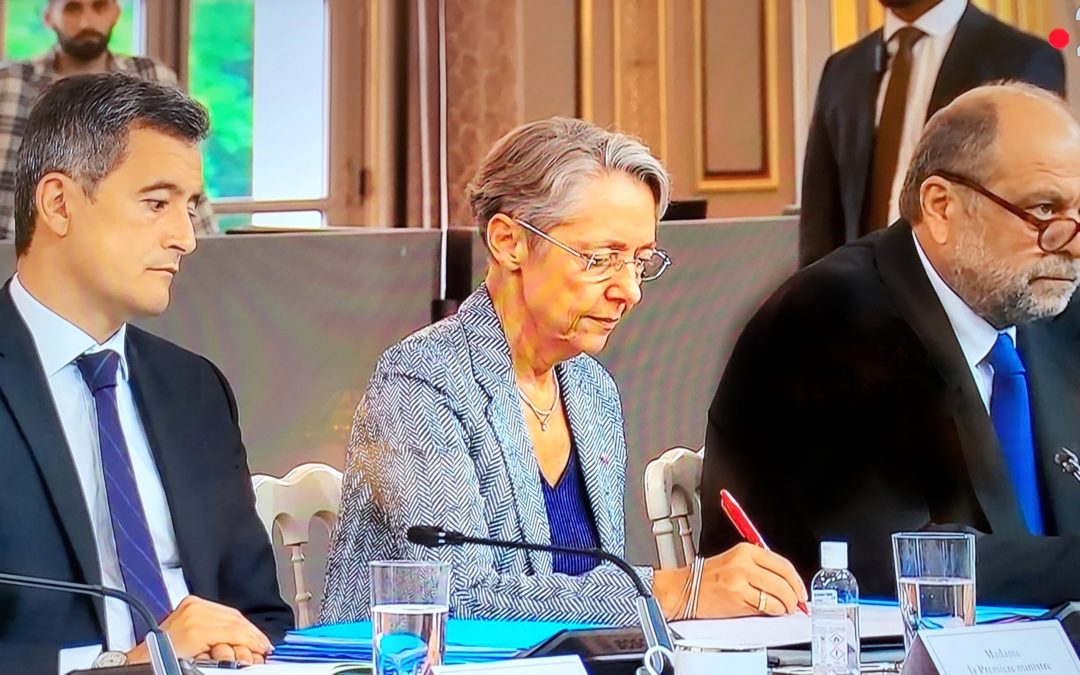The appointment of France’s new prime minister – or perhaps I should say prime ministress – has touched off a linguistic debate that many think should have been settled long ago.
President Emmanuel Macron, who was elected to a second five-year term last month, last week named Elisabeth Borne, holder of several ministerial posts in the previous term, to be only the second woman ever to lead a government. The president immediately tweeted her title:
Chère @Elisabeth_Borne,
Madame la Première ministre,
Écologie, santé, éducation, plein-emploi, renaissance démocratique, Europe et sécurité : ensemble, avec le nouveau gouvernement, nous continuerons d’agir sans relâche pour les Françaises et les Français.— Emmanuel Macron (@EmmanuelMacron) May 16, 2022
That is, she was to be known as “Madame la première ministre.”
Why is that significant? Because the word “ministre” is masculine in gender; French is one of those languages where every noun is either feminine or masculine. A male prime minister would normally be addressed as “Monsieur le premier ministre.”
The ensuing debate touched on an issue that encapsulates France’s increasingly polarized politics, its attitudes toward feminism and its holdout resistance to women in positions of power.
And sadly, by the standards of the French language it was entirely unnecessary. The Académie Française, the official guardian of the French language, declared in 2019 that it was fine to “Frenchisize” the titles of jobs held by women. So female heads of corporations could be cheffes and not chefs, and bosses would be called patronnes and not patrons. Lawyers could be avocates and not avocats, professeurs could be professeures, and so on.
For years before that, women had been fighting to be called what they were, not man-named versions of what they were. In this 2018 video, Brune Poirson, a junior environment minister, makes her case clear at the Assemblée Nationale, the parliament. You don’t have to speak French to understand her point or note the smirks and catcalls she gets in response.
Similarly, earlier this year, Ecology Minister Barbara Pompili, from Macron’s party, told rightist legislator, or deputy, Julien Aubert that if he kept calling her Madame LE ministre she would call him Monsieur LA députée. (At the beginning of this clip). At least she got applause and not catcalls.
"Monsieur la députée, si vous continuez à m'appeler Madame le Ministre", déclare @barbarapompili en préambule de sa réponse à @JulienAubert84. "Mon sujet en tant que ministre de l'énergie, est de faire en sorte que l'on puisse approvisionner nos concitoyens en électricité". #QAG pic.twitter.com/uAqVzcydkN
— LCP (@LCP) January 25, 2022
In the case of Borne, it was the far right that jumped all over the terminology. Eric Zemmour, a horrifying mix of racist, fascist and antisemite, and who got 7% of the vote in the first round of the presidential election, said on television that he would only call Borne “Madame le premier ministre,” adding that the feminine version was “ugly to the ear.”
It’s quite a turnabout for a language whose protectors resist change. Borne’s female predecessor, Edith Cresson, who was prime minister from 1991 to 1992, was universally known as “Madame le ministre.”
Many years ago, as a journalism intern in Paris, I wrote an article about France’s first female Army general, who was called “Madame le général.” That is, masculine. I was very embarrassed when some editor in New York changed it to Madame LA général, which no one used in France then.
Even until recently, women lawyers writing memos would address the note to “mon cher confrère”—my dear male colleague – regardless of the gender of the recipient, says my friend Marc Lempérière, a lawyer. Now, they are more likely to address female memo recipients as “ma chère consoeur” and describe their profession as “avocate.”
The linguistic transition was complicated by the fact that the wife of a high official often uses his title in feminized form, so that, for instance, the wife of the head of the Paris bar council, himself the “batonnier,” was “Madame la batonnière.” (The arrival of a woman at the head of the council muted but did not end the debate.)
This was a real tangle when we at the American Cathedral in Paris appointed our first woman dean (chief rector) in 2013 and had to figure out what her title in French would be. Needless to say, there was no existing model to follow. Normally a dean would be “le doyen” and his wife would be “la doyenne.” Did we have to say “Madame le doyen?” We opted for modernity and went with “Madame la doyenne.”
As far as I could find, Borne herself has not spoken on the issue of her title. She dedicated her nomination speech to “all the little girls” and urged them to “follow their dreams.”
It’s not clear for how long it will matter, either. Parliamentary elections will be held next month. If Macron doesn’t get a working majority, which gives him the right to name his government, France may be back to a monsieur as premier ministre.
–Photo editing by James Schwartz

Great article, Anne. Thank you!
Thanks so much, Hilary!
Interesting!
Insightful. Thank you. Interesting to see how different European countries deal with similar issues years after others.